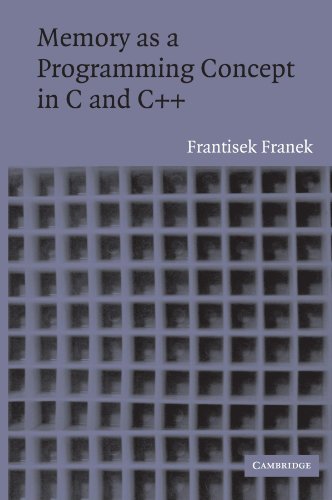Memory as a Programming Concept in C and C++ pdf download
Par gagne lynn le mardi, juin 28 2016, 03:23 - Lien permanent
Memory as a Programming Concept in C and C++ by Frantisek Franek


Memory as a Programming Concept in C and C++ Frantisek Franek ebook
Publisher: Cambridge University Press
Format: chm
ISBN: 0521520436, 9780521520430
Page: 272
Introduction This article is a continuation of the C/C++ Visual Studio Express debugger series. This hash table is written using Mintomic, a portable library for lock-free programming in C/C++ which I released last month. We created an array of 4 int blocks dynamically using keyword new. It compiles & runs on several x86/64, PowerPC and ARM-based platforms straight out of the box. Many of these efforts, notably the C++0x concept design, have run into trouble by focusing on the design of language features. However, there are still many C++ programmers out there so there still some PL researchers working on C++, and it is a nice/uncrowded niche if you can stomach it. *p = 5; // run-time error: stack corruption. This is used to mention sized of dynamic array. Notice square brackets after data type int. Address of the first block of array gets stored in p. Write parallel programs using a simple model: With only three keywords to learn, C and C++ developers move quickly into the parallel programming domain. Part 1 provided a quick start guide in using the debugger. And I think EVERY programmer should have used a language that requires you to allocate and free memory (it is much easier now with the latest C++ standard and stuff like smart pointers but you still need to understand how new and delete work in order If you have been programming in Java, Scala, Ruby or Python for the last decade and never touched C or C++, now with C++11 I think it is time to learn C++11 and improve your programming skills while doing so. Re "hierarchical & sequential": con/destructors and RAII ultimately tie memory and resource lifetime to sequential control flow through hierarchically nested scopes. Since this results in a 4-byte pointer pointing to 1 byte of allocated memory, writing to this pointer will either cause a run-time error or will overwrite some adjacent memory. Memory Management - posted in General Programming: I am setting up a simple memory management in my program and I would like some feedback. Not only does it have countless features neither C# nor C possess, C++ has protracted (but useful) initially nonintuitive behavior that is oriented towards expert programmers. In contrast to the C-style cast, the static cast will allow the compiler to check that the pointer and pointee data types are compatible, which allows the programmer to catch this incorrect pointer assignment during compilation.